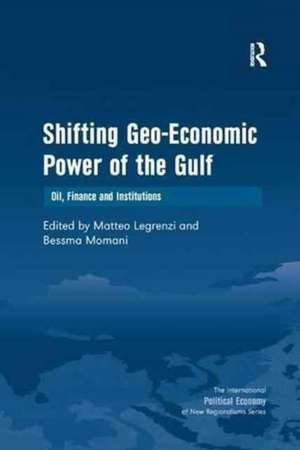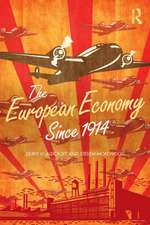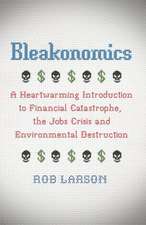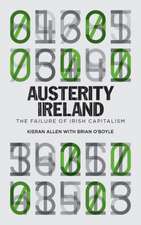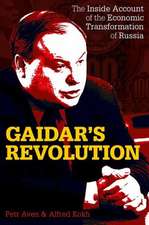Shifting Geo-Economic Power of the Gulf: Oil, Finance and Institutions
Autor Bessma Momani Editat de Matteo Legrenzien Limba Engleză Paperback – 15 noi 2016
| Toate formatele și edițiile | Preț | Express |
|---|---|---|
| Paperback (1) | 469.34 lei 6-8 săpt. | |
| Taylor & Francis – 15 noi 2016 | 469.34 lei 6-8 săpt. | |
| Hardback (1) | 1061.81 lei 6-8 săpt. | |
| Taylor & Francis – 28 mai 2011 | 1061.81 lei 6-8 săpt. |
Preț: 469.34 lei
Nou
Puncte Express: 704
Preț estimativ în valută:
89.81€ • 92.79$ • 74.71£
89.81€ • 92.79$ • 74.71£
Carte tipărită la comandă
Livrare economică 19 martie-02 aprilie
Preluare comenzi: 021 569.72.76
Specificații
ISBN-13: 9781138261358
ISBN-10: 1138261351
Pagini: 266
Dimensiuni: 156 x 234 x 14 mm
Greutate: 0.45 kg
Ediția:1
Editura: Taylor & Francis
Colecția Routledge
Locul publicării:Oxford, United Kingdom
ISBN-10: 1138261351
Pagini: 266
Dimensiuni: 156 x 234 x 14 mm
Greutate: 0.45 kg
Ediția:1
Editura: Taylor & Francis
Colecția Routledge
Locul publicării:Oxford, United Kingdom
Notă biografică
Matteo Legrenzi is Assistant Professor in the Graduate School of Public and International Affairs, University of Ottawa, Canada and Bessma Momani is an Associate Professor at the University of Waterloo, Canada
Recenzii
'Bessma Momani and Matteo Legrenzi have put together an extremely valuable collection of new work by predominantly younger scholars on a subject - the Gulf Arab export economies - that is curiously under researched. Essential reading for both the academy and the policy community, this edited work has the freshness and originality to define the literature for a generation.' Philip Robins, St Antony's College, University of Oxford, UK 'This volume represents a milestone in published research on the political economy of the oil-exporting states of the Gulf Cooperation Council. It brings together a closely edited and coherent set of original studies on the changing nature of these economies, on evolving policies and economic strategies, and on their developing presence in the regional and global economy. The economic future of these states and their growing regional and international roles are subjects of crucial importance, and this book makes a major contribution to filling the gap in understanding that continues to hamper analysis and policy-making by outsiders. That these rigorous but accessibly written analyses are strongly anchored in the respective disciplines of the authors makes them more, not less, relevant for those concerned with policy - while simultaneously providing an unrivalled new source for students and scholars of the political economy and shifting global roles of the Gulf states.' Gerd Nonneman, University of Exeter, UK This book is a must read for academics, economists, and policymakers with interest in the AGS [Arab Gulf States]. It builds on and supplements other works on these economic and financial topics...’ Digest of Middle East Studies
Cuprins
Introduction: The Geo-Economic Power of the Gulf, Bessma Momani, Matteo Legrenzi; Part I Economic Diversification and Rentier Politics in the Gulf Arab States; Chapter 1 Gulf Arab States’ Investment of Oil Revenues, Mary Ann Tétreault; Chapter 2 The Political Economy of Monetary Integration and Exchange Rate Regime in the GCC, Giacomo Luciani; Chapter 3 Economic Diversification in the Gulf Arab States: Lip Service or Actual Implementation of a New Development Model?, Martin Hvidt; Chapter 4, Steffen Hertog; Chapter 5 Institutional Competition and Symbiosis in the Gulf: The Politics of Efforts to Establish an International Islamic Financial Policy Forum, Andrew Baker; Chapter 6 Oil and Financialization in the Gulf Cooperation Council, Samer N. Abboud; Part II Gulf Arab Investments and Trade; Chapter 7 The GCC’s International Investment Dynamics: The Role of Sovereign Wealth Funds, Rachel Ziemba, Anton Malkin; Chapter 8 Arab Sovereign Wealth Funds: The Challenge of Transparency, Sara Bazoobandi, Tim Niblock; Chapter 9 Gulf Arab Sovereign Wealth Funds: Governance and Institution Building, Sven Behrendt; Chapter 10 Shifting Gulf Arab Investments into the Mashreq: Underlying Political Economy Rationales?, Bessma Momani; Chapter 11 The Gulf Arab States and Asia Pacific: Geo-Economics and Interdependency, Christopher M. Davidson; Chapter 12 Geo-Political Complications of US Free Trade Agreements with Gulf Arab Countries, Fred H. Lawson; conclusion Conclusion – Repositioning the Gulf: The GCC in the Twenty-First Century Global Political Economy, Crystal A. Ennis, Paul Doherty;
Descriere
This volume brings together, for the first time, distinguished Gulf experts to analyze the renewed geo-economic prominence of the oil-exporting states in the Gulf. It investigates some of these 'new power brokers' in the world economy and what this shift in global economic power means for the international economic system.
